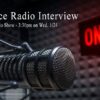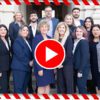Practice Tips
Tales of Civility in the Time of Pandemic
AUTHORS: Carolin Shining and Erin Joyce PUBLISHED: LOS ANGELES LAWYER OCTOBER 2020
Carolin Shining is a solo attorney with a biochemical background specializing in intellectual property and class action litigation in Los Angeles. Erin Joyce, a former California State Bar prosecutor, is a defense lawyer in Pasadena, California. They serve on the executive committee of LACBA’s Small Firm and Solo Practitioner Section, the LACBA Presidential Advisory Committee on Women in the Law, and the LACBA Structured Networking Steering Committee.
Download printable PDF of Los Angeles Lawyer – October 2020
Echoing Charles Dickens in A Tale of Two Cities, “It was the best of times, it was the worst of times, it was the age of wisdom, it was the age of foolishness, it was the epoch of belief, it was the epoch of incredulity…it was the spring of hope, it was the winter of despair….” [cite: 1] In the early days of the coronavirus pandemic, as doubtless was the case in the tumultuous days of the Reign of Terror described by Dickens, attorneys who pursued cases “as usual” met significant surprises in the courthouse. Judges scrambled to find new ways to keep cases moving forward during the societal upheaval, remote technologies were instantly embraced, social distancing enforced, and other previously unimagined limitations on courtroom behavior adopted. Litigation conduct once deemed admirable and zealous was no longer tolerated due to necessary changes in court operations.
Out of these tragic events, a positive result for the legal profession has been created, and silver linings now abound. The paradigm shift created by the pandemic offers new opportunities for civility and appreciation of well-being strategies. Judicial reactions to the pandemic offer an opportunity to create more humane strategies that may lead to better outcomes. Attorneys are finding that conceptions of zealousness are evolving along with the needs of society at large.
As the emergency created by the pandemic grew in March and April 2020, judges across the United States took many litigants to task for acting as if nothing had changed. In one widely reported case, U.S. District Court Judge Steven C. Seeger of the Northern District of Illinois severely chastised the holder of copyrighted fantasy cartoon designs. Judge Seeger used the opportunity to send a message:
Plaintiff recognizes that the community is in the midst of a “coronavirus pandemic.”… But Plaintiff argues that it will suffer an “irreparable injury” if this Court does not hold a hearing this week and immediately put a stop to the infringing unicorns and knock-off elves.… If there’s ever a time when emergency motions should be limited to genuine emergencies, now’s the time.… The filing calls to mind the sage words of Elihu Root: “About half of the practice of a decent lawyer is telling would-be clients that they are damned fools and should stop.” The world is facing a real emergency. Plaintiff is not. [cite: 2]
Judge Seeger’s disapproval was no doubt inspired in part by the Seventh Circuit’s Standards for Professional Conduct, which define litigation as a “truth-seeking process designed to resolve human and societal problems in a rational, peaceful, and efficient manner.” [cite: 3] Plaintiffs’ timing ran afoul of these standards during the worst of the emergency. In the Southern District of Florida, Magistrate Judge Jonathan Goodman was also unamused when a litigant opposed a routine motion to continue trial:
Plaintiff’s motion represents that Defendant objected to the request [to continue deadlines in light of the global pandemic]. That’s right. Defendant objected to what appears to be a realistic and commonsense motion to reschedule the trial and other deadlines. I had to read the certification twice in order to make sure that I was reading it correctly…. Rather than guess at defense counsel’s motivation, the Undersigned requires defense counsel to by March 26, 2020 file a double-spaced memorandum explaining (1) whether he did, in fact, oppose the motion to reschedule the trial and enlarge trial-related deadlines and the mediation deadline, and (2) all the reasons justifying his opposition.…
Before filing this response, though, defense counsel may want to brush up on the concepts or [sic] karma, goodwill, grace, compassion, equity, charity, flexibility, respect, spirituality, selflessness, kindness, public spirit, social conscience, and empathy. [cite: 4]
Magistrate Judge Goodman had earlier shared an equal level of opprobrium when he denied an “emergency” request to compel a corporate deposition during the pandemic:
Moving past the incorrect and, frankly, the reckless designation of this dispute as an “emergency,” the Undersigned is shocked that counsel could not on their own resolve the issue. Given the health and economic crisis we are in, not postponing the deposition scheduled for next week is patently unreasonable. If all the issues we are currently facing were to be organized on a ladder of importance, this deposition-scheduling dispute would not even reach the bottom rung of a 10-rung ladder. [cite: 5]
Judge Amy Totenberg of the U.S. District Court sent similar messages indicating that civility should take precedence over any attempt to use the pandemic to gain an advantage. Judge Totenberg’s preferred method was to issue an order in every single case on her docket simply telling all parties to “be kind” during this period. [cite: 6] The pandemic also was the subject of an ex parte brought on March 19, 2020, in the Rogers v. Lyft, Inc. cases to immediately enforce California Assembly Bill 5 in favor of Lyft drivers. [cite: 7] Counsel argued that the pandemic created a new emergency regarding the public good: As independent contractors, Lyft drivers might feel compelled to drive passengers even when the driver was ill. If AB 5 was ordered to be enforced by a preliminary injunction, drivers theoretically could avoid this Hobson’s choice and receive sick pay from Lyft directly.
U.S. District Court Judge Vince Chhabria simultaneously acknowledged the broad challenges facing society but denied the request. He specifically criticized the counsel’s “tone-deafness” in making these arguments while the “crisis unfolds.”8 He also grappled with the difficulty posed by the impact of the pandemic and concomitant shutdowns:
The coronavirus pandemic has caused millions of people to lose their jobs entirely. Millions more have seen their income streams decimated. And many of these people were already living hand to mouth. Their only recourse during the crisis will be to rely on emergency aid from the federal and state governments— aid like cash payments, unemployment benefits, emergency refundable tax credits, and sick pay. [cite: 9]
In the end, however, the court did not find it credible that Lyft drivers would intentionally drive passengers while knowing they could be ill with the novel coronavirus. In the pandemic’s early days, courts and litigants were faced with crucial, life-threatening decisions. The response of many courts was to focus the parties on considerations normally completely outside of the realm of the courthouse such as “being kind” and “examining empathy.” Judicial calls for humanity and self-reflection are a potential paradigm shift in the creation of a new civility and layers of zealousness.
Epoch of Incredulity
Echoing Dickens’s “epoch of incredulity,” bad behavior was not limited to the judicial system. Some attorneys acted with extreme rashness and found themselves squarely in national headlines. In early April, an intellectual property attorney in New Jersey was criminally charged for holding an impromptu rock concert via Facebook Live that attracted numerous people in violation of emergency orders. In a public statement on April 6, 2020, New Jersey Attorney General Gurbir Grewal explained why severe criminal charges were warranted:
The governor’s executive orders are common-sense measures to keep people safe during this historic health crisis.… When people…flout the orders and show disrespect and hostility to police officers, they not only put themselves and the others immediately involved in peril, they risk inciting others to engage in such irresponsible and dangerous behavior.” [cite: 10 ]
Some members of the judiciary also acted outside the new norms of civility. In direct violation of local emergency orders and over objections of the public defender, a local Ohio judge issued arrest warrants for 33 criminal defendants who had not appeared for routine hearings. Literally adding insult to injury, the judge ordered, on videotape, the public defender not to call his clients and then personally insulted him after he left the courtroom. As a result of this rash conduct, the Ohio Supreme Court removed the judge from the bench pending investigation. [cite: 11]
Similarly, in a Michigan criminal court, an Oakland County judge detained several criminal defendants at the same time as his judicial colleagues were releasing detained persons due to COVID-19 concerns. [cite: 12] One of the detainees was a 61-year-old man who had been late as he had been in urgent care for viral pneumonia that day. Likewise, a young mother was detained for being 20 minutes late to court, and her hearing was continued well into April. News reports indicated that the local ACLU and her attorney were able to secure a writ for her release. During the first few months of the pandemic, courts, counsel, and clients were forced to adapt to a “new normal” that caused disruptions throughout the legal system and stressors on many. Since March 2020, attorneys have learned to adapt to changed circumstances, embrace technology, and recognize—often at the insistence of judges—that increased civility is now a necessity.
Hope after Despair
During the pandemic, the strong words of certain members of the judiciary have given rise to a new hope: Increased civility required by the current conditions can change the legal profession for the good. The inclinations of lawyers to ignore or even take advantage of the pandemic is understandable in some respects—lawyers are born and bred to be relentless in the pursuit of justice. [cite: 13]
As long ago as 400 B.C., the Greek philosopher Hippocrates developed the idea that there were several basic temperaments among people, including the “Driven” and the “Analytical.” [cite: 14] Such “driven” and “analytical” people exemplify generally positive traits needed by attorneys. Being driven helps attorneys deal with high levels of stress. Being analytical helps attorneys make good decisions under pressure. Indeed, even the way in which lawyers are inculcated into the profession is through the intense and heightened levels of stress of the bar exam. The culture induces pressures as early as law school, and the bar exam demonstrates that high-intensity traits are essential for lawyer survival. [cite: 15]
These personality traits in lawyers also obviously have a darker side: Driven and analytical people are also generally irritated by irrational change, frustration, and delay. The axiom “justice delayed is justice denied” is written largely in every attorney’s mind. Instead of calm deliberation, the attorney’s perception is that speed matters; timely mediations, firmly held trial dates, immediate responses to urgent client needs are crucial. [cite: 16]
However, the grinding halt to court proceedings and nearly the entire U.S. economy during the early days of the pandemic changed everything. Control over attorneys’ cases and their very businesses evaporated in less than a month’s time. Without warning or the ability to prepare, emergency court closures, continuations, approval of video hearings, and other orders came online every day. Mediations were canceled or moved online with private break-out video rooms. Electronic filing and service—long debated and delayed in some areas—was rushed and made mandatory. Attorneys scrambled to safely equip home offices while monitoring breaks, lunch hours, and ergonomics for home workers. Offices struggled to determine which staff members were “essential.” Electronic signing and notaries were approved. Mothers and fathers faced billable hour deadlines as they juggled the homeschooling of children. Merely following the daily deluge of emergency orders required patience and diligence.
Epic Challenges
Despite these epic challenges, practitioners have responded with equally epic grace. Unprecedented calls have resulted in actual self-reflection as to the direction of the profession. Judges Seeger and Goodman suggest that lawyers need to consider whether time-worn strategies of pressure and “giving no quarter” may be unhealthy for themselves and for their clients. Through the shock of the pandemic, lawyers have been forced to reconnect with principles of thoughtful negotiation, reframing concepts of zealousness and delving into habits for wellness, fellowship, and mindfulness.
Old-school lessons from leaders in negotiation, strategy, and wellness are being rediscovered as a way to prosper in the post-pandemic era. As one example, the seminal text of modern negotiation, Getting to Yes: Negotiating Agreement Without Giving In, [cite: 17] has long provided solutions to deal with “hard bargainers.” If scorched earth pressure tactics are frowned upon in a post-COVID-19 crisis world, a deep look into time-tested strategies can prove helpful. [cite: 18]
It is often hard to decide what it means to negotiate in “good faith.” People draw the line in different places. It may help you to ask yourself such questions as: Is this an approach I would use in dealing with a good friend or a member of my family? If a full account of what I said and did appear in the newspapers, would I be embarrassed? In literature, would such conduct be more appropriate for a hero or a villain? [cite: 19]
The authors conclude: “It is easier to defend principle than an illegitimate tactic….” [cite: 20]
Using civility, negotiators of all kinds may learn again to separate demands made of people from underlying solutions to problems. A return to focusing on interests, not positions, may bear fruit. Parties can consider how to invent options for mutual gain. Indeed, even trial lawyers will be forced to consider how the pressures of exposure to COVID-19 will weigh on jurors. This will inevitably lead to different considerations on which cases should indeed be tried. Consideration of courtesy on both sides may help separate out those issues for the foreseeable future. Such win-win solutions taught to many long ago in law school and then quickly forgotten, give those in the bar the ability to move forward with civility and diligence.
The judges who rejected the harsh practices of litigants in the early days of the pandemic implicitly were striking back at long-held definitions of what it means to be “zealous” or use “diligence” in the service of clients’ rights. These tensions have been debated for decades. For example, the ABA Model Rules of Professional Conduct literally begin with a discussion of these two competing ideals: [cite:21] “Virtually all difficult ethical problems arise from conflict between a lawyer’s responsibilities to clients, to the legal system and to the lawyer’s own interest in remaining an ethical person while earning a satisfactory living.” [cite:22] This precise ethical dilemma resulted in cognitive dissonance during the stress of the pandemic closures.
In thinking through the needs of an attorney both to be diligent and zealous and to maintain an ethical balance, it is worth noting that the meaning of the word “zealous” has changed dramatically over time. [cite:23] In the eighteenth century, its meaning evolved from being “warmly engaged or ardent on behalf of something” into being “fiercely partisan” or “uncompromisingly enthusiastic.”[cite:24] Yet, in light of necessary sacrifices called for during the pandemic, attorneys are asking themselves the same questions demanded by Judge Goodman, i.e., “Is what I am doing really good for society, for my client, and for my own long-term health?” The answer is that the ability to show grace and courtesy during times of immense stress maybe not only the best way to represent a client but also the best way to support and strengthen our legal system as a whole. Increasingly, it is becoming the best way of favorably impressing the court.
Seismic Changes
Driving these concerns are seismic changes in the operation of our legal system. In only a few weeks’ time, law firms shut massive and expensive physical locations. Thousands shifted into home offices. Video hearings in juvenile and criminal matters were authorized. Resistance to electronic filing, service, signatures, and court appearances melted.
Technology certainly has helped with keeping the practice of law in motion. Technology, however, is not without its toll on well-being. [cite:25] Studies indicate that lawyers are already the loneliest of all of the professions [cite:26]—and working from home exacerbates this condition in many instances. However, lawyers are natural problem solvers and have responded to the new pressures and isolation caused by the pandemic. Supportive networking groups using video technology have been created almost overnight from scratch. Bar associations have led the way with online discussions on stress, mental health, and resiliency. Bar association wellness task forces such as the Los Angeles County Bar Association’s Well-Being Task Force and the California Lawyers Association Wellness Committee have offered free CLE and advice on these issues. Some law firms are routinely checking in with staff using “virtual happy hours” designed to alleviate stress. Lawyers gave free or greatly discounted advice to those in need of immediate relief and support. While some firms engaged in large layoffs of associates, a few law firms countered this trend by giving bonuses to employees or financial support for incoming law clerks to help get through the crisis. Many lawyers and their firms have graciously pivoted and adjusted to the “new norms.”
All these strategies point a way for lawyers to adapt. Many bring tremendous opportunities for well-being, health, and a stronger sense of community into the profession. As noted in the American Bar Association’s comprehensive 2017 Report from the National Task Force on Lawyer Well-Being, “[t]o be a good lawyer, one has to be a healthy lawyer.” [cite:27] In the uncharted territory of the post-pandemic world, civility and wellness are no longer simply buzz words. As stated by Los Angeles Superior Court Presiding Judge Kevin Brazile:
Civility is one of the bedrock principles of the legal profession. In light of the COVID-19 public health crisis we are facing today, civility is more important now than ever before. We are living in uncertain times and making our way through uncharted waters, which causes stress, anxiety, and challenges. These emotions can easily carry over into our everyday lives and in our work as lawyers and judges, which makes it essential to observe and promote civility. There will be no handshakes and wearing masks will hide the smiles—so for the near future, only our words and behavior towards one another will communicate that while we work vigorously and argue forcefully, we do so respectfully, civilly. We must remember that we are all in this together, and together, we will get through it. [cite:28]
Thus, the courts have spoken and continue to speak—practical common sense, wellness, and civility will be the rule going forward, not the exception.
Source Link LACBA|Los Angeles Lawyer
Citations:
1 CHARLES DICKENS, A TALE OF TWO CITIES 9 (Global Classics, 2017) (1859).
2 Art Ask Agency v. The Individuals, Corps., etc., No. 1:20-cv-01666, 2020 WL 1427085, slip op. at *1 (N.D. Ill. Mar. 18, 2020).
3 STANDARDS FOR PROF’L CONDUCT WITHIN THE SEVENTH FED. JUDICIAL CIRCUIT, Preamble, available at https://www.insd.uscourts.gov/sites/insd/files /Standards for Professional Conduct.pdf (last accessed Aug. 30, 2020). See also U.S. Dist. Ct., C.D. Cal., Civility and Professionalism Guidelines, available at https://www.cacd.uscourts.gov/attorneys /admissions/civility-and-professionalism-guidelines
4 Martinez v. Cherry Bekaert, LLP, No. 1:18-cv25429, Paperless Order (Fla. Dist. Ct. App. Mar. 25, 2020), available at https://www.courtlistener.com /docket/14801282/martinez-v-cherry-bekaert-llp / (Item 48).
5 C.W. v. NCL (Bahamas, Ltd.), No. 1:19-cv-24441- CMA, Paperless Order (Fla. Dist. Ct. App. Mar. 21, 2020), available at https://www.courtlistener.com /docket/16393363/cw-v-ncl-bahamas-ltd/ (Item 38). See also ABA, Civility Pledge (June 2, 2020): “We recognize that overly aggressive litigation tactics and incivility among lawyers (including among judges and between judges and lawyers) bring disrespect to the legal system and the role of the lawyer, increase the cost of resolving disputes, and do not advance legitimate interests.” The text can be found at www.americanbar.org/groups/litigation/policy/conduct_guidelines/civility_pledge/
6 Hailey Konnath, In Stressed Legal Industry, Calls for Kindness During Crisis, Law360 (Mar. 20, 2020), https://www.law360.com/articles/1254685/instressed-legal-industry-calls-for-kindness-during-crisis
7 Rogers v. Lyft, Inc., No. 20-cv-01938-VC, 2020 WL 1684151, slip op. at *1-2 (N. 7 Rogers v. Lyft, Inc., No. 20-cv-01938-VC, 2020 WL 1684151, slip op. at *1-2 (N. D. Cal. Apr. 7, 2020) (The court at the same time chided Lyft for refusing to comply with the requirements of AB 5 and lamented that “[i]n short, there are no heroes in the story of this case.”)
8 See also A.B. 5, 2019-2020 Reg. Sess. (added by Stats. 2019, ch. 296, §1). AB 5 codifies the “ABC” test adopted in Dynamex Operations West, Inc. v. Super. Ct. 4 Cal. 5th 903 (2018).
9 See also On Fire Christian Ctr., Inc. v. Greg Fischer, et al., No. 3:20-CV-265-JRW, slip op. at 3 (W.D. Ky., Apr. 11, 2020) (granting a temporary restraining order against an order to close church services on Easter Sunday).
10 Emma Cueto, NJ IP Atty In Hot Water Over Pink Floyd Covers Concert, Law360 (Apr. 6, 2020), https://www.law360.com/ip/articles/1260609/nj-ip -atty-in-hot-water-over-pink-floyd-covers-concert.
11 Khaleda Rahman, Ohio Judge Issues Arrest Warrants for Courtroom No-Shows During Coronavirus Pandemic, NEWSWEEK, Mar. 26, 2020, available at https://www.newsweek.com/ohio-judge -issues-arrest-warrants-no-shows-coronavirus -pandemic-1494463.
12 Bill Laitner, Oakland County judge tosses people in jail for showing up late, even amid pandemic, DETROIT FREE PRESS, Apr. 2, 2020, available at https://www.freep.com/story/news/local/michigan /oakland/2020/04/02/oakland-county-judge-leo -bowman-jail/5101562002/ (updated Apr. 4, 2020).
13 Finton Constr., Inc. v. Bidna & Keys, APLC, 238 Cal. App. 4th 200 (Cal. Ct. App. 2015) (defendant successfully wins Anti-SLAPP motion as lawsuit against counsel for alleged acceptance from client of stolen hard drive that was protected activity).
14 BOB PHILIPS & KIMBERLY ALYN, HOW TO DEAL WITH ANNOYING PEOPLE: WHAT TO DO WHEN YOU CAN’T AVOID THEM 165 (2003).
15 Cf. Letters from Jorge E. Navarette, Clerk and Executive Officer of the California Supreme Court to Alan Steinbrecher, President of the State Bar re Delaying July State Bar exam until Sept. 9-10, 2020 and encouraging development of remote or electronic proctoring (Apr 28, June 10, 2020).
16 CAL. R. OF PROF’L CONDUCT R. 1.1 (Diligence) (Nov. 1, 2018).
17 ROGER FISHER ET AL., GETTING TO YES: NEGOTIATING AGREEMENT WITHOUT GIVING IN 134-36 (1981).
18 Id.
19 Id. at 148.
20 Id.
21 ABA, MODEL RULES OF PROF’L CONDUCT, Preamble and Scope, §§2, 8. See also ABA, MODEL RULES OF PROF’L CONDUCT R. 8.4(c) (misconduct to engage in dishonesty, fraud, deceit or misrepresentation); FED. R. CIV. P. 11; N.D. CAL. GUIDELINES FOR PROF’L CONDUCT, Preamble (“counsel are encouraged to zealously represent their clients within the highest bounds of professionalism”); see also CAL. R. OF PROF’L CONDUCT R. 1.1 (competence), 1.3 (diligence). While California’s rules use the term “diligence,” case law long has referenced the term “zealous.” People v. McKenzie, 34 Cal. 3d 616, 631 (1983); see also ABA, MODEL RULES OF PROF’L CONDUCT DR 7-101(A)(1), DR 7-102(A)(8).
22 ABA, MODEL RULES OF PROF’L CONDUCT, Preamble and Scope, §9.
23 It is important to note that neither the old nor new California Rules of Professional Conduct actually use the word “zealous.” Instead, the concepts of “diligence” and “candor” are used in Rules 1.1 and 1.3. Nevertheless, the term zealousness is invoked by California courts as a function of these duties. See Finton, supra note 9; see also Silberg v. Anderson, 50 Cal. 3d 205, 214-15 (Cal. 1990) (“[California Civil Code] Section 47(2) [regarding litigation privilege] further promotes the effectiveness of judicial proceedings by encouraging attorneys to zealously protect their clients’ interests.”)
24 MERRIAM-WEBSTER, https://www.merriam -webster.com/dictionary/zealous (last accessed Apr. 4, 2020).
25 Samantha Stokes, Homebound by Coronavirus, Lawyer-Parents Bear Extra Burden, Law.com (March 18, 2020), https://www.law.com/american lawyer/2020/03/18/homebound-by-coronavirus -lawyer-parents-bear-extra-burden/.
26 Shawn Anchor et al., America’s Loneliest Workers, According to Research, HARVARD BUS. REV., Mar. 19, 2018, available at https://hbr.org /2018/03/americas-loneliest-workers-according-to -research.; see also ABA, Report from the National Task Force on Lawyer Well-Being (Nov. 9, 2018).
27 National Task Force on Lawyer Well-being, Creating a Movement To Improve Well-Being in the Legal Profession (Aug. 14, 2017), available at (https://lawyerwellbeing.net/wp-content/uploads /2017/11/Lawyer-Wellbeing-Report.pdf).
28 Private communication via e-mail from Hon. Presiding Judge Kevin Brazile, L.A. Super. Ct., as transmitted by Mary Hearn of L.A. Super. Ct. to Carolin K. Shining (May 28, 2020).
LAW IN THE NEWS
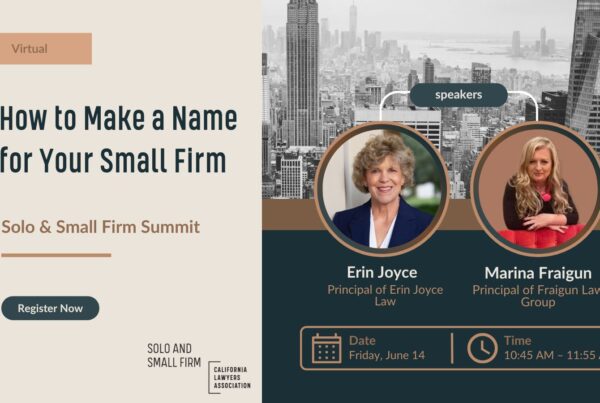
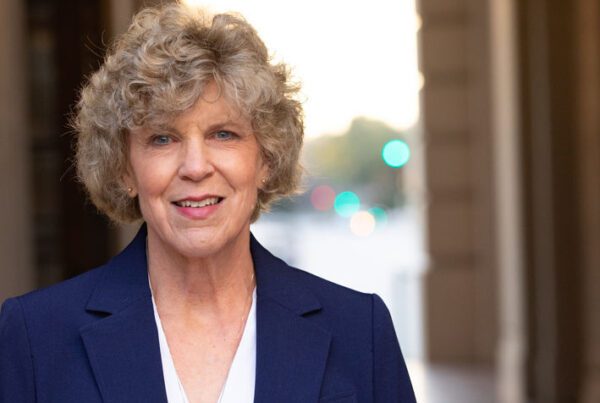
Top Professional Responsibility Lawyers 2024
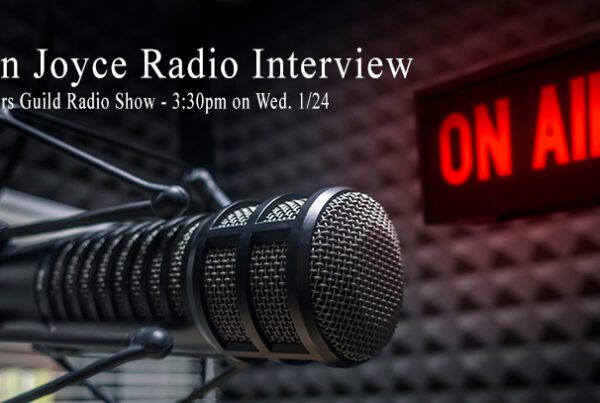
Lawyers Guild Radio Show
CONTACT ERIN JOYCE LAW
REPRESENTING CLIENTS THROUGHOUT ALL OF CALIFORNIA
When you get a letter from the State Bar, don’t go it alone! You need competent, experienced counsel to respond to the State Bar at every stage. Your license is at risk, so ensure you have the best representation from a former State Bar prosecutor before sending any response to an investigator or responding to formal charges leveled by the State Bar. You cannot make an informed decision without good advice. Call Erin now.








